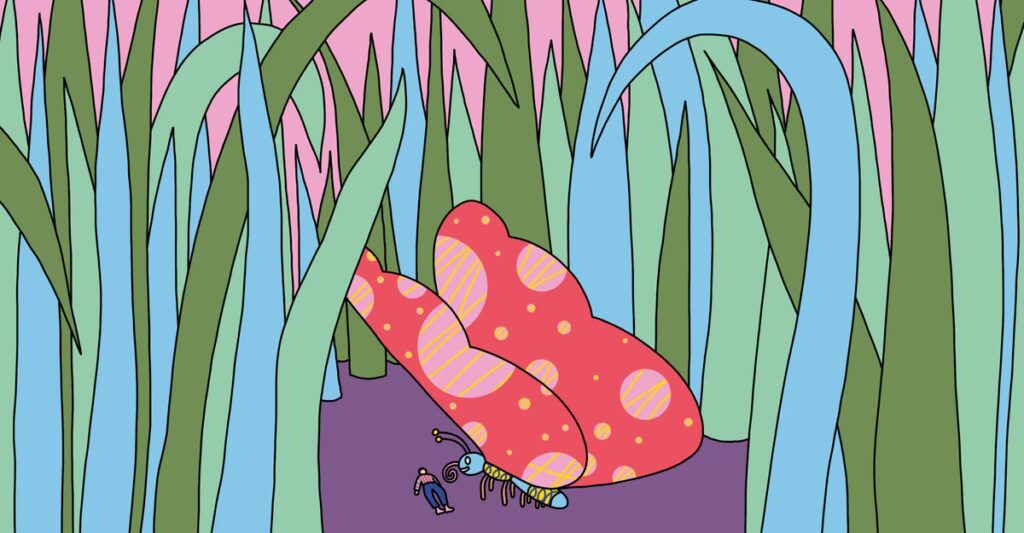Want to stay current with Arthur’s writing? Sign up to get an email every time a new column comes out.
Early in my academic career, I noticed that one of the most popular classes on campus was Introduction to Astronomy, a general-science course that anyone could take. The students all loved it—especially the non-science majors. I asked one of them, an economics student, why she enjoyed astronomy so much. She didn’t say anything about stars, but she did say something powerful about earthly existence. “When I go into class on Thursday mornings, I usually am stressed out about my life,” she told me. “But 90 minutes later, I feel relief because I am just a speck on a speck.”
She was expressing a profound philosophical truth. We tend to believe that to be happier, we need to become bigger in our own mind, and in the minds of others. But that’s wrong. What we really need to achieve both the perspective on life we need and the peace we crave is to get smaller in relation to everything and everyone else. When we experience our own littleness, we stop blocking our ability to see our life in just proportion. We can relax into a humble reality of not being the object of attention and criticism, and we can appreciate a magnificent universe without spoiling it with our self-absorption and petty concerns.
Unless you suffer from a narcissistic personality disorder, you know that, being completely honest with yourself, you are not the center of most things in life. Virtually all of the time, other people are thinking about themselves, not you, and the world would continue with little disruption if you weren’t here at all. It is very possible that even your own great-grandchildren will not know your name. And yet, when you aren’t making a conscious effort to recognize these truths, you go about your business with the illusion that you are, in fact, the focus of intense outside interest.
[Arthur C. Brooks: The key to critical self-awareness]
People care what you think and do, you believe—after all, they judge you all day long, both positively and negatively. Or so you think. This self-aggrandizing fantasy is almost certainly a product of evolution: By thinking that they mattered more as individuals than they actually did, your ancestors strove to rise in social hierarchies. This work of constantly comparing themselves with others made it more likely that they would pass on their genes in a competitive mating environment. You inherited their delusions of grandeur.
But this comes at a cost: Thinking about yourself all the time makes you miserable over the long term. Researchers have shown that such self-focus can provoke emotional problems, making social situations or task performance feel frightening and unpleasant. Self-focus is especially deleterious for people who by nature have high social anxiety: Neuroscientists have observed hyperactivation of brain structures associated with anxiety when these people are instructed to think about themselves. An additional downside is that self-focus makes performing skilled tasks less enjoyable. In a study of basketball players published in 2002, sports psychologists instructed one group of players to focus on their own performance during warm-up. These players experienced higher anxiety than others who were not given this instruction.
And the reward? Even success in hierarchy-climbing is costly. Primate researchers studying wild baboons have shown that the highest-ranking males have greater testosterone levels than lower-ranking males, but they also have raised glucocorticoid levels, indicating constant elevated levels of stress. In humans, stress-hormone levels fall among those high in status only when their position is stable. Personally, I know no one who has made their way to the top who feels the slightest bit secure about their position.
All of this might strike you as strange. Mother Nature tells you to do something that makes you miserable. And the more miserable you get, the more you do it. But Mother Nature simply doesn’t care whether you’re happy. She just wants you to ascend the hierarchy and pass on your genes. Happiness is your problem, not hers.
As I have shown in the past, getting happier very often requires you to resist your natural tendencies, not give in to them. The world is constantly inviting you to try to make yourself appear bigger in others’ eyes and in your own; this fact underpins the entire social-media business model. The trick to finding happiness is to get smaller. Here are three ways you can achieve that.
1. Stand in awe.
I have previously cited the work of the UC Berkeley psychologist Dacher Keltner about the importance for happiness of standing in awe, which he defines as the “feeling of being in the presence of something vast that transcends your understanding of the world.” The reason that awe raises happiness is that it makes you smaller—exactly the feeling that the econ student was expressing about her astronomy class. But there are ways to experience awe besides looking at the night sky through a telescope. Keltner recommends spending time in nature, enjoying great music and art, and witnessing acts of moral beauty. Find what leaves you speechless and transfixed, and you will understand.
2. Seek the divine.
A common theme in most major religions involves the loss of self through communion with the divine. In Sufism, this is called fanā’, or “the annihilation of the ego.” The 13th-century Sufi mystic Rumi wrote about fanā’ in exquisite metaphors; in this poem, he compared his self to a “clear bead”:
There are no edges to my loving now.
The clear bead at the center
changes everything.
Modern neuroscience has revealed how this works. With colleagues, Columbia University’s Lisa Miller has shown that recalling spiritual experiences lowers activity in the medial thalamus and the caudate, brain regions that control sensory and emotional processing; this allows us to transcend our ordinary concerns and focus on deeper questions than how many people liked your latest social-media post.
[Peter Wehner: Awe is essential]
3. Quietly serve others.
Virtually all of the many experiments on charitable behavior show that giving raises well-being—especially when it is anonymous, with no spotlight on your virtuous acts. One 2020 study demonstrated this in a novel way by studying anonymous kidney donors. The 114 donors were, on average, significantly happier than the general population after their donation to a stranger. You don’t have to give away an organ to benefit from this effect—just give more of yourself, without expectation of acknowledgment or reward. That way, you are truly transcending yourself.
This evidence for the happiness-enhancing power of self-abnegation might seem like a repudiation of what we have heard for decades about the importance of self-esteem. At one level, this is true insofar as high self-esteem leads to pleasant feelings in the short term. But working this psychological lever is not especially helpful for a good and satisfying life over time, and indeed it can lead to narcissism, by returning us to the delusion of our own importance and the constant need to maintain a mirage that we are at the center of everything. The opposite approach—finding peace and perspective in smallness—is the lasting way to well-being.
So relax into the reality of your cosmic smallness. The plain truth is that you are a speck on a speck. But you’re a lovely little speck, and beloved by a few other specks. That’s a good life.
The post How to Be a Happy Speck in Time appeared first on The Atlantic.




